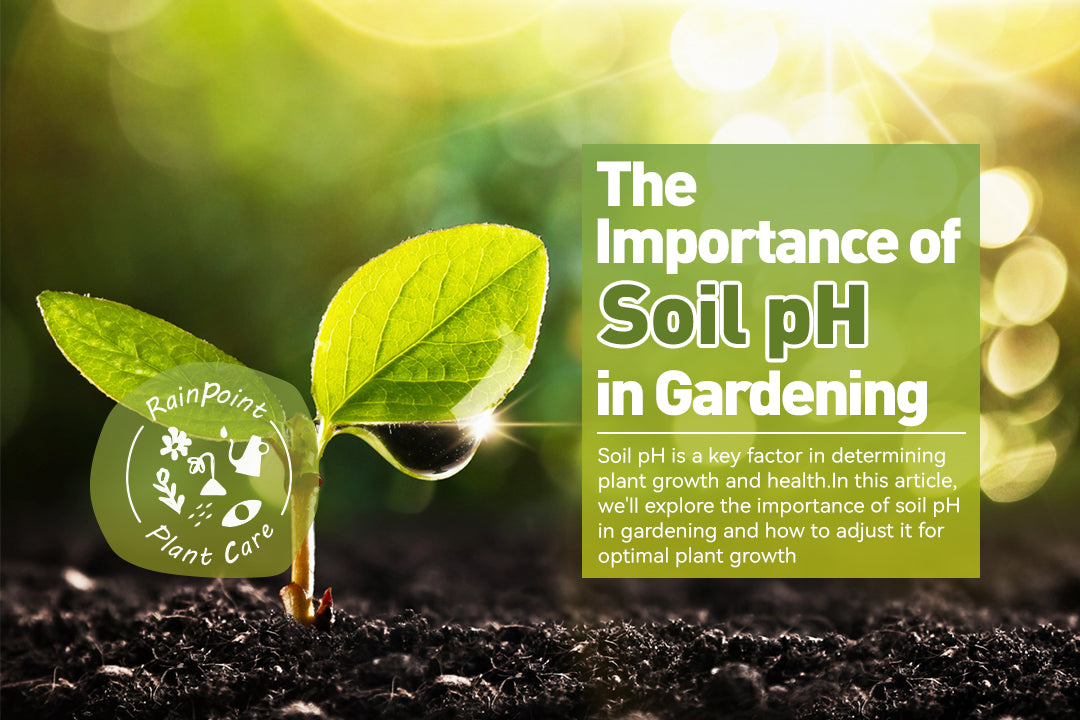As a gardener, you probably already know that the quality of the soil can make or break a garden. But have you ever considered the role of soil pH in gardening? Soil pH is a key factor in determining plant growth and health.
In this article, we'll explore the importance of soil pH in gardening and how to adjust it for optimal plant growth.
What is Soil pH?
Soil pH is a scale that measures the acidity or alkalinity of the soil, which affects the supply of nutrients to plants. The pH scale ranges from 0 to 14, with higher values for stronger alkalinity and lower values for stronger acidity.
- A pH below 7 means that the soil is acidic
- A pH values above 7 indicate alkaline soils
- A pH of 7 indicates a neutral soil

Most plants prefer neutral or slightly acidic soils with a pH between 5.5 and 7.0. However, some plants, such as blueberries, azaleas, and hydrangeas, prefer more acidic soils. Others, such as lavender, lilac, and syngonium, prefer more alkaline soils.
Why is Soil pH Important?
Soil pH is important for both plant growth and nutrient uptake. It will control the solubility of soil trace elements, as well as the activity of harmful elements, which can have an impact on plant growth.
When the pH level is too high or too low, the availability of certain nutrients is reduced and plants may suffer from nutrient deficiencies.
When the pH Levels Are Too High (Alkaline):
- Plant nutrients such as iron, manganese, and zinc are less available and iron chlorosis (an iron deficiency) can occur
- Water and nutrients are difficult to be absorbed by plants, which can lead to stunted growth and yellowing of leaves
- Calcium, sodium, and magnesium levels can increase to toxic levels.
When the pH Levels Are Too Low (Acidic):
- Soils that are too acidic reduce the solubility of nutrients such as phosphorus and molybdenum, which can lead to nutrient loss and waste, resulting in stunted growth, yellowing of leaves, and poorly developed fruit or flowers
- The uptake of elements such as aluminum, iron, manganese, and zinc become high and the concentration tends to reach toxic levels
- Tends to cause soil caking, making air and interstices in the soil less available and detrimental to plant root growth
- Is not conducive to the survival of beneficial organisms such as beneficial bacteria or earthworms. It can also cause beneficial organisms to become less abundant and less active
- Tends to breed fungi and bacteria, causing the occurrence of yellow wilt and root rot

How Do You Determine the pH Level of The Soil?
To ensure the best pH level of soil for your garden, it is important to test your soil regularly. You can purchase a soil pH test kit at your local garden center or online. These kits usually come with a test strip or a probe that you insert into the soil to get a pH reading. Another option is to send a soil sample to a lab for analysis. This may be a more accurate method, but it can also be more expensive and time-consuming.

How Do I Manage Soil pH Levels?
Once you have determined the pH level of your soil, you can adjust it to meet the needs of your plants.
Use a Soil Amendment
If your soil is too acidic, you can add lime to reduce the acidity (raise the pH). If your soil is too alkaline, you can add sulfur to balance it (lower the pH).
It is important to note that these adjustments should be made gradually over time, as sudden changes in soil pH can be harmful to plants. It’s important to use additives carefully, as too many can harm plants and even cause drastic pH changes. It is best to follow the recommended rates and methods for each specific amendment and plant type.

Use of Organic Matter
Add organic matter, such as compost or well-rotted manure, to the soil. This can help improve soil structure, increase water-holding capacity, and add nutrients to the soil. Mulching the soil can also help reduce soil erosion.
Choosing the Right Plants
Different plants have different preferences for soil pH. By choosing plants that match the pH of your garden soil, you can ensure that your plants thrive and avoid nutrient deficiencies. If the pH of the soil is not suitable for a particular plant, you may also want to consider container planting or raised bed planting with a soil mix that is suitable for that plant.
In addition, gardeners can use pH-sensitive plants such as hydrangeas as indicators of your soil’s pH level. Hydrangeas are known to produce flowers of different colors depending on the pH of the soil, with blue flowers indicating acidic soil and pink flowers indicating alkaline soil. By planting hydrangeas in the garden, gardeners can monitor the pH level of the soil and adjust it accordingly.

Summary
Understanding the importance of soil pH in gardening is essential to achieving healthy and productive plants. Soil pH affects nutrient availability, microbial activity, and plant growth. By understanding and managing soil pH, you can enjoy the benefits of a thriving garden and harvest fresh produce and beautiful outdoor spaces.


